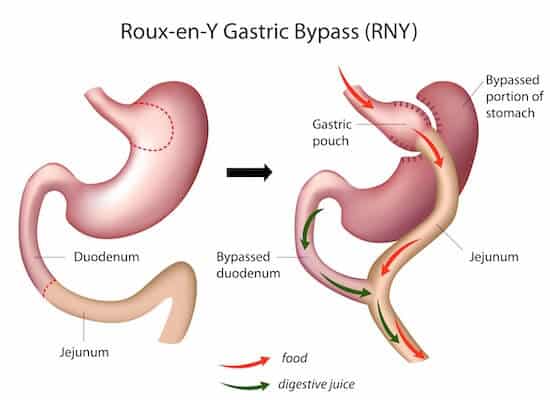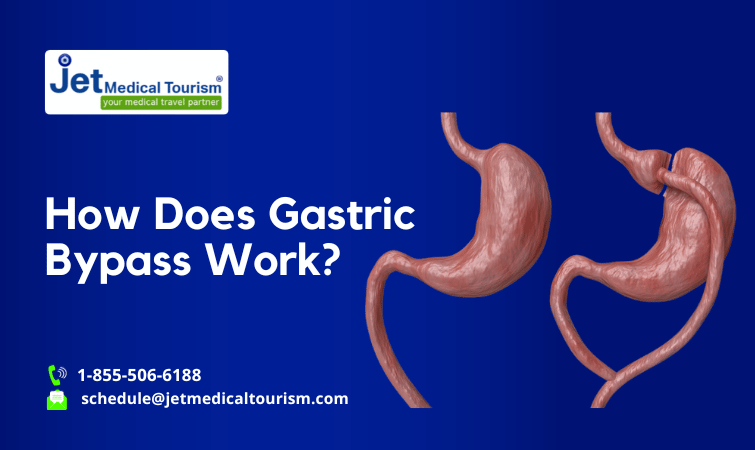How Does Gastric Bypass Work?
Gastric bypass surgery has emerged as a life-changing option for individuals struggling with severe obesity. This surgical procedure, designed to help with significant weight loss, has transformed countless lives by not only reducing weight but also improving various obesity-related health conditions. However, deciding to undergo gastric bypass is a major decision that requires a thorough understanding of how it works, its benefits, and potential risks.
In this blog, we will delve into the mechanics of gastric bypass surgery, explore its effectiveness, and address common concerns such as the potential for post-surgery weight gain, pain levels associated with the surgery, and what life is like after the procedure. Whether you’re considering this RNY surgery for yourself or a loved one, this comprehensive guide will provide valuable insights to help you make an informed decision.
How Does Gastric Bypass Work to Lose Weight?

Gastric bypass surgery involves creating a small pouch from the stomach and connecting it directly to the small intestine. This surgical alteration helps in two main ways:
1. Restriction
The newly created stomach pouch is much smaller, limiting the amount of food you can consume at one time. This reduction in food intake leads to fewer calories being consumed overall.
2. Malabsorption
By bypassing a portion of the small intestine, the surgery reduces the number of calories and nutrients your body absorbs from the food you eat. This contributes to further weight loss.
Is Gastric Bypass Worth It?
The decision to undergo gastric bypass surgery is significant and should be made after careful consideration of the benefits and potential risks.
Benefits
- Significant Weight Loss: Most patients lose about 60-80% of their excess weight within the first year after surgery.
- Improved Health Conditions: Many obesity-related conditions such as type 2 diabetes, hypertension, and sleep apnea often improve or resolve.
- Enhanced Quality of Life: Weight loss can lead to increased mobility, higher energy levels, and improved mental health.
READ: Is Gastric Bypass Safe?
Risks
- Surgical Complications: As with any surgery, there are risks of complications such as infections, bleeding, and adverse reactions to anesthesia.
- Nutritional Deficiencies: Because the body absorbs fewer nutrients, patients must take vitamin and mineral supplements to avoid deficiencies.
- Dumping Syndrome: Eating high-sugar foods can cause nausea, vomiting, and diarrhea due to rapid gastric emptying.
Can You Still Be Fat After a Gastric Bypass?


While gastric bypass surgery is highly effective, it is not a guaranteed solution for everyone. Achieving and maintaining long-term weight loss success depends on various factors. Here’s a detailed look at what can influence outcomes post-surgery:
1. Adherence to Dietary Guidelines
a) Importance of Dietary Changes
Post-surgery, the size of the stomach is drastically reduced, which means patients must make significant changes to their eating habits. The smaller stomach pouch can only handle small portions of food, and patients must choose nutrient-dense foods to meet their nutritional needs without overeating.
b) Risks of Non-Adherence
Consuming high-calorie, high-fat, or sugary foods can hinder weight loss efforts. These types of foods can lead to weight regain because they are calorie-dense and can be consumed in larger quantities without making you feel full. Additionally, sugary foods can cause dumping syndrome, a condition where food moves too quickly from the stomach to the small intestine, leading to nausea, vomiting, and diarrhea.
c) Strategies for Success
Patients are typically provided with a detailed dietary plan that includes:
- Small, frequent meals: Eating smaller meals more frequently helps manage portion sizes and maintain energy levels.
- High-protein intake: Protein is essential for muscle maintenance and repair.
- Avoiding empty calories: Foods high in sugar and fat but low in nutrients should be avoided.
- Hydration: Drinking plenty of water, but not with meals, helps with digestion and satiety.
2. Physical Activity
a) Role of Exercise in Weight Loss
Incorporating regular physical activity is essential for maintaining weight loss after gastric bypass surgery. Exercise helps burn calories, improve cardiovascular health, and build and maintain muscle mass, which can boost metabolism.
b) Types of Recommended Exercises
- Cardiovascular exercises: Such as walking, jogging, cycling, or swimming, help burn calories and improve heart health.
- Strength training: Building muscle through weightlifting or resistance exercises helps increase the metabolic rate.
- Flexibility and balance exercises: Yoga or stretching can enhance overall fitness and prevent injuries.
c) Overcoming Barriers to Exercise
Patients may face physical or psychological barriers to exercise. Working with a fitness trainer experienced in post-bariatric surgery patients or joining a support group can provide motivation and guidance.
READ: 10 Things I Wish I Knew Before Gastric Sleeve And Gastric Bypass
3. Psychological Factors
a) Emotional and Psychological Challenges
Psychological factors such as emotional eating, stress, and depression can significantly impact weight loss success. Many individuals use food as a coping mechanism for emotional issues, which can lead to overeating and weight regain.
b) Importance of Mental Health Support
Addressing these psychological challenges is crucial for long-term success. This can involve:
- Therapy: Cognitive-behavioral therapy (CBT) or other forms of counseling can help address emotional eating and develop healthier coping mechanisms.
- Support groups: Joining a support group for bariatric patients provides a community of individuals facing similar challenges and can offer encouragement and advice.
- Mindfulness practices: Techniques such as meditation and mindfulness can help manage stress and reduce emotional eating.
READ: Bariatric Surgery Psychological Evaluation: An Ultimate Guide
4. Medical Conditions
a) Impact of Medical Conditions on Weight
Certain medical conditions and medications can affect metabolism and weight. Conditions such as hypothyroidism, polycystic ovary syndrome (PCOS), and insulin resistance can make weight loss more challenging.
b) Medication Considerations
Some medications, such as antidepressants, antipsychotics, and corticosteroids, can contribute to weight gain or hinder weight loss efforts.
c) Importance of Regular Medical Follow-Ups
Regular follow-ups with healthcare providers are necessary to monitor and manage these conditions. This can involve:
- Adjusting medications: Ensuring that medications are not contributing to weight gain.
- Regular screenings: Monitoring for conditions that can impact weight loss.
- Nutritional supplements: Ensuring adequate intake of vitamins and minerals to prevent deficiencies due to reduced absorption.
How Painful is Gastric Bypass Surgery?
Understanding the pain associated with gastric bypass surgery can help alleviate some of the anxiety surrounding the procedure. While pain levels vary among individuals, advancements in surgical techniques and pain management strategies have significantly minimized discomfort and facilitated faster recovery.
Gastric bypass surgery is typically performed laparoscopically, a minimally invasive technique that involves making several small incisions in the abdomen rather than one large incision. This approach has several benefits:
- Reduced Pain: Smaller incisions generally cause less trauma to the body, resulting in less post-operative pain compared to traditional open surgery.
- Faster Recovery: Patients often experience quicker recovery times and shorter hospital stays.
- Lower Risk of Complications: Laparoscopic surgery is associated with a lower risk of infection and other complications.
Post-Surgery Pain Management
Effective pain management is crucial for a smooth recovery after gastric bypass surgery. Here are the key strategies used to manage pain post-operatively:
A. Pain Medications
Types of Pain Medications
- Prescription Pain Relievers: Medications such as opioids (e.g., morphine, oxycodone) may be prescribed for short-term use to manage severe pain immediately after surgery.
- Non-Opioid Pain Relievers: Medications such as acetaminophen and nonsteroidal anti-inflammatory drugs (NSAIDs) can be used to manage moderate pain and reduce inflammation.
B. Administration Methods
- Intravenous (IV) Medications: Initially, pain medications may be administered intravenously in the hospital to provide quick relief.
- Oral Medications: As patients begin to recover, they transition to oral pain medications which they can continue taking at home as needed.
C. Activity and Movement
Gradual Increase in Activity
- Early Mobilization: Encouraging light movement and walking soon after surgery helps reduce the risk of complications such as blood clots and promotes overall recovery.
- Gradual Increase: Patients are advised to gradually increase their activity levels, starting with gentle exercises and slowly progressing to more vigorous activities as tolerated.
Benefits of Activity
- Reduced Pain and Stiffness: Movement helps prevent stiffness and reduces pain by promoting blood circulation and reducing swelling.
- Improved Healing: Physical activity aids in the healing process and helps patients regain strength and mobility more quickly.
D. Follow-Up Care
Regular Check-Ups
- Surgeon Visits: Regular follow-up appointments with the surgeon are essential to monitor recovery, address any complications, and manage pain effectively.
- Monitoring for Complications: Check-ups allow for the early detection and treatment of potential complications such as infections, hernias, or issues related to the surgical site.
Pain Management Adjustments
- Tailored Pain Management Plans: Based on individual recovery progress and pain levels, healthcare providers may adjust pain management plans, including changing medications or dosages.
- Patient Education: Educating patients on how to manage pain at home, including the use of medications, activity modifications, and other pain relief techniques, is crucial for a comfortable recovery.
Additional Pain Management Techniques
Non-Medication Approaches
- Ice and Heat Therapy: Applying ice packs to the surgical site can reduce swelling and numb pain. Heat therapy may be used later to relax muscles and improve blood flow.
- Relaxation Techniques: Practices such as deep breathing exercises, meditation, and progressive muscle relaxation can help manage pain by reducing stress and promoting relaxation.
- Supportive Devices: Using supportive devices such as abdominal binders can provide additional comfort and support to the surgical area, reducing pain and aiding recovery.
What to Expect After Gastric Bypass Surgery
Immediate Recovery
Patients usually stay in the hospital for 2-3 days post-surgery. Initially, you’ll consume a liquid diet, gradually transitioning to pureed and then solid foods.
Long-Term Adjustments
- Dietary Changes: Lifelong dietary adjustments are necessary to ensure proper nutrition and avoid complications.
- Regular Exercise: A consistent exercise routine is vital for maintaining weight loss.
- Monitoring and Support: Regular medical follow-ups and support groups help address any challenges and ensure continued success.
Conclusion
Gastric bypass surgery is a powerful tool for weight loss and improving health, but it requires a lifelong commitment to dietary and lifestyle changes. Understanding the procedure, its benefits, and potential challenges can help you make an informed decision. Always consult with healthcare professionals to determine if gastric bypass is the right option for you.
Experience Life-Changing Results: Gastric Bypass Surgery in Mexico Awaits!
Is weight holding you back from living your best life? Consider gastric bypass surgery in Mexico, where expert care and affordability come together. Our highly trained surgeons and modern clinics are ready to help you achieve lasting weight loss.
Take the first step towards a new you. Schedule your consultation today and learn more about the benefits of gastric bypass surgery.




